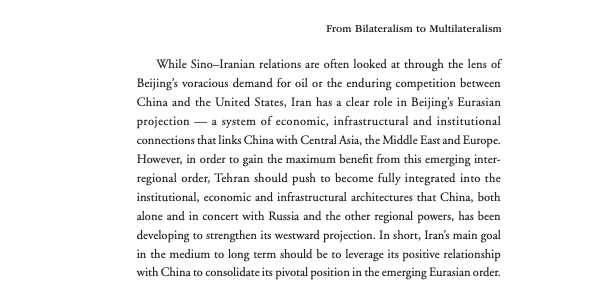1. Today, @BourseBazaar + @MEI_NUS launch a new edited volume that examines Iran& #39;s bilateral relations in Eurasia through six essays by six superb analysts.
Here& #39;s the big claim:
It is no longer sufficient to see Iran as a state in the Middle East. https://www.bourseandbazaar.com/research-1/2020/6/4/iran-in-the-new-eurasian-context">https://www.bourseandbazaar.com/research-...
Here& #39;s the big claim:
It is no longer sufficient to see Iran as a state in the Middle East. https://www.bourseandbazaar.com/research-1/2020/6/4/iran-in-the-new-eurasian-context">https://www.bourseandbazaar.com/research-...
2. When @MEI_NUS asked me to edited this volume last year, I had one condition—I wanted to commission my peers. In this volume, six young and talented analysts explain the new workings of Iranian foreign policy and economic relations. I& #39;m very grateful to MEI for the opportunity.
3. The volume includes six superb essays:
@NicoleGrajewski on Russia-Iran
@jacoposcita on China-Iran
@sumithakutty on India-Iran
@MehranHaghirian on GGC-Iran
@Daniel_Amir1 on Israel-Iran
Axel Hellman on EU-Iran
If you don& #39;t already follow them, now is the time!
@NicoleGrajewski on Russia-Iran
@jacoposcita on China-Iran
@sumithakutty on India-Iran
@MehranHaghirian on GGC-Iran
@Daniel_Amir1 on Israel-Iran
Axel Hellman on EU-Iran
If you don& #39;t already follow them, now is the time!
4. In the 9 months during which we have been working on these essays, the thesis that the "Eurasian context" is perhaps the most salient framework to understand Iran& #39;s bilateral tries has only become easier to substantiate.
I explain why in my introduction:
I explain why in my introduction:
5. What struck me in reviewing the essays is how the simple prompt to write about bilateral ties in the new "Eurasian context" led to analyses of Iran in which the U.S. was an inherently peripheral player.
That& #39;s unusual and it& #39;s important!
That& #39;s unusual and it& #39;s important!
6. In many respects, I think these essays point to a needed corrective. In deemphasizing the US, the essays in this volume are perhaps more indicative of the actual strategic considerations around political, economic, and security ties between Iran and its fellow Eurasian states.
7. The reporting of the China-Iran deal offers a great example. Widely described as a "response" or "challenge" to the US, the prospect of a deal looks very different when viewed in the Eurasian context, as @jacoposcita& #39;s excellent essay on China-Iran makes clear. From his intro:
8. But the essays also deal with the limitations of the "Eurasian" framing. It can be easy to get carried away with the idea that China + Russia are replacing the American-led order via a common Eurasian design. @NicoleGrajewski cautions in her superb essay on Russia-Iran ties:
9. @MehranHaghirian on GCC-Iran and @Daniel_Amir1 on Israel-Iran also deftly trace how the US continues to loom large in bilateral relations, even states face new Eurasian dynamics. Here is @Daniel_Amir1 on regional rivals having new "common friends" in China and Russia:
10. Axel Hellman& #39;s essay on EU-Iran and @sumithakutty& #39;s essay on India-Iran ties point to the ways in which US pressure on allies to sever ties with Iran has failed to account for Eurasian realities. Here is @sumithakutty on the "long-standing logic" of India& #39;s ties with Iran:
11. These essays are exciting because they offer a new way to read politics + economics, therefore suggesting a new way to craft policy on Iran and the region.
We are at a creative dead-end with the "Middle East" context.
It& #39;s time to try something different and constructive.
We are at a creative dead-end with the "Middle East" context.
It& #39;s time to try something different and constructive.
12. The full volume and the essays can be downloaded here. https://www.bourseandbazaar.com/research-1/2020/6/4/iran-in-the-new-eurasian-context">https://www.bourseandbazaar.com/research-...

 Read on Twitter
Read on Twitter






